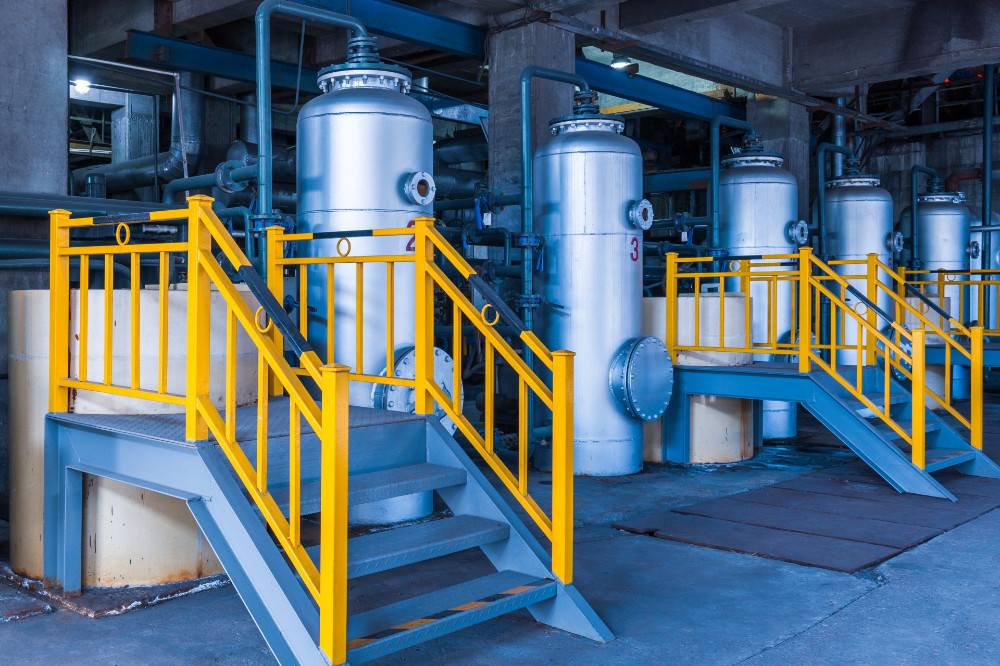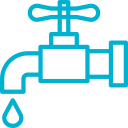Industrial Water
Industrial WATER
NIRA empowers operations around Indonesia to protect water as the most vital resource of existence.
By having a collaborative and positive partnership mindset in mind, NIRA is working to develop innovative solutions for industrial clients’ specific water needs and sustainable goals.

Demineralized Water
One of our industrial water output solutions is demineralized water.
Why do our Industrial Clients Choose Us?

Tailored water solution adjusted to your specified needs, requirements, and quality standards

Optimization of your industrial water cycle and water footprint

Improving your financial performance: No CapEx, Pay per liter consumed, Free Operation & Maintenance over the contract period

ULTRAPURE WATER
Ultrapure water solutions
Ultrapure water (UPW) is a highly purified water that is versatile for highly sensitive applications due to its fulfillment of high levels of specification. As a standard, the water has a resistivity of 18.2 MΩ.cm, TOC < 10 ppb, and bacterial count <10 CFU/ml. Also, the water must not contain any detectable endotoxins to be classified as ultrapure.
UPW is dominantly used in semiconductors, solar cells, and pharmaceutical industries – and it is also an ideal solution for laboratory work.
NIRA understands how essential it is for our clients to have access to ultrapure water, or whatever the required water grade needed for their work. The technologies provided by NIRA can reduce impurities to extremely low levels. NIRA helps you achieve the correct water purity for any required application and optimize your operation, in a cost-effective manner.

COOLING TOWER MAKE-UP WATER
Protect Your Cooling Tower & Improve Operating Efficiency
Cooling towers are a vital part of almost every aspect of our lives. You can find cooling towers anywhere, such as in hospitals, schools, hotels, and many more. Primarily, cooling towers are used for industrial purposes whereby the towers function to transfer heat safely from inside an active system to the outside environment. The process involves recirculating water to remove heat generated from a variety of industrial processes.
In this way, cooling towers require cooling tower make-up water that is used to replace water lost from evaporation, drift, and blowdown in a cooling cycle.
In order to protect the equipment that handles the cooling water, cooling water treatment is needed. Cooling tower make-up water needs to be properly treated to avoid damage upon cooling water system such as corrosion, scale, and solids deposition. The treatment involves utilizing the right filtration technologies, chemical products, and processes such as solids removal, softening, pH adjustments, and many more, in order to remove impurities and contaminants.
NIRA gives you the right cooling water treatment solution so that you can minimize your cooling water system downtime, improve equipment efficiency, reduce the need for equipment replacement, reduce health & safety risks – or achieve any specific goal of your business.

BOILER FEED WATER
Prevent Your Asset Corrosion and Boiler Downtime
An effective operation of industrial steam generation systems needs high-purity feed water to generate high-quality steam and transfer heat across the entire facility.
Both high- and low-pressure boilers require treated boiler feed water in order to optimize equipment performance and maintenance. Removal of organics, dissolved mariners, suspended particles, and dissolved gas can inhibit scaling and fouling – thus, avoiding boiler failure, minimizing plant downtime, and saving costly maintenance fees.
Different boilers and standards of quality or chemistry of the feed water would require different treatment processes. NIRA offers tailored treatment solutions for your boiler feed water challenges. Enabling you to achieve your specified feed water quality level, NIRA helps you to prevent asset corrosion and boiler downtime, optimize water use, and hence, save operational costs.
Innovative Technology
NIRA’s provides extensive range of water treatment technologies that enable customization of water solution to every client coming from various fields.

Reverse Osmosis

Filtration
The filtration process involves water passing through filters that have varied pore sizes and are made of different materials (e.g. charcoal, gravel, and sand). The filters would remove dissolved particles and germs in the water.

Clarification
The clarification process takes away suspended solids through gravity settling, producing a clarified liquid effluent. There is a wide range of clarification solutions and NIRA chooses the right clarification technology for your specified industrial water need.

Ultrafiltration (UF)
Ultrafiltration process can be used as an addition or as a substitute for traditional filtration. The filter in the ultrafiltration method only allows water and extremely small molecules (e.g. salts) to pass through as the filter membrane has a very small pore size.

Ion Exchange
Ion Exchange is a specialized technology that can eliminate dissolved ions and contaminants from water. By allowing ion exchange resins attract undesirable ions in water and exchange them with more desirable ions, the system effectively purifies and improves water quality.

Reverse Osmosis (RO)
Reverse osmosis can be considered as a variation of filtration method that removes additional particles from water. The RO technology is widely used in wastewater recycling, water treatment to produce demineralized water, and treating salt water for drinking.

Activated Carbon (AC)
Activated Carbon filters function mainly to absorb pollutants and eliminate taste and odors in water treatment systems, including organic compounds such as volatile organic compounds, pesticides, and benzene.

Electrodialysis (ED)
Electrodialysis (ED) is a technique that relies on an electric field gradient and can be used to separate minerals from feed water solution. This technology is primarily used for brackish water desalination and removal of hardness from industrial wastewater.




